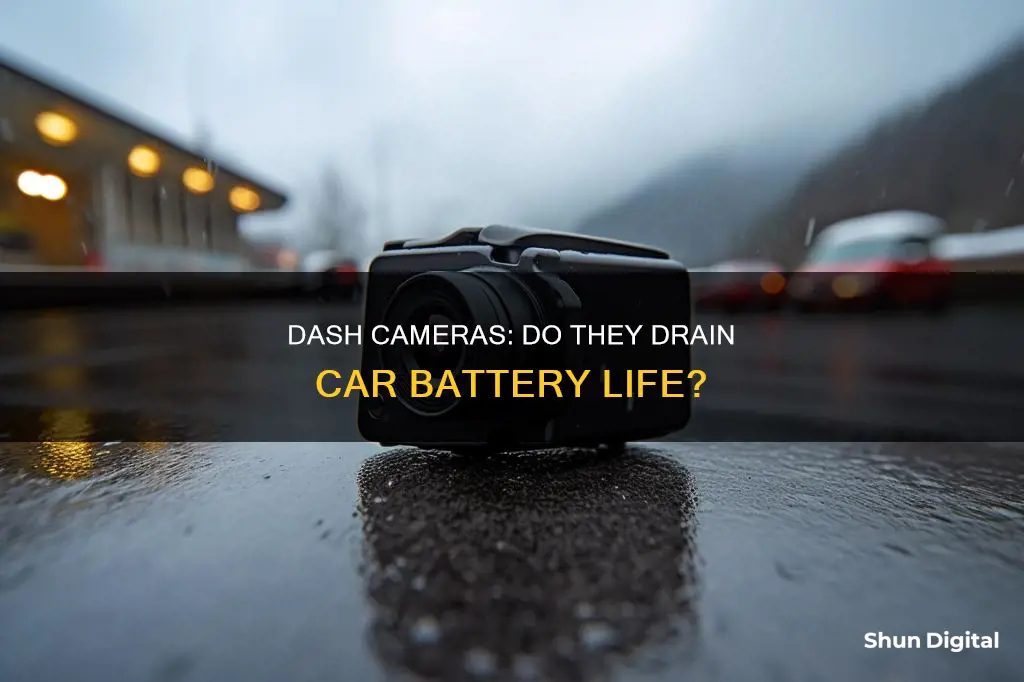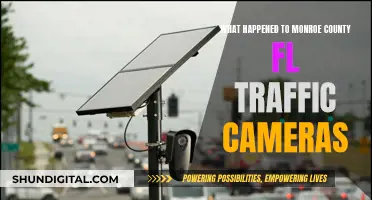
Dash cameras are a great way to protect yourself in the event of an accident or incident on the road. They are also useful for preventing theft, clearing up insurance issues, and fighting traffic tickets. But do they waste car fuel? The short answer is no. Dashcams do not affect your car battery at all when you are driving, as the engine is converting fuel into electricity. However, if your car is in the on position but the engine is not running, then the dashcam will drain your battery faster, along with other equipment such as playing music or charging your phone. Overall, dashcams are a valuable tool for drivers, and with proper configuration, they can also be set up to record even when the car is turned off, providing added security and peace of mind.
| Characteristics | Values |
|---|---|
| Drain car battery | No, but will do so faster if the car is in the "on" position and the engine isn't running |
| Use | Mounted on the dashboard or hanging from the windshield to record as you drive |
| Power source | Plugged into a car via a USB port or cigarette plug |
| Memory | SD card or micro SD card |
| Cost | $30 to $40 for a personal camera |
| Legality | Generally legal in the UK and US, but there are some nuances depending on the state/country |
What You'll Learn

Dash cameras do not drain a car's battery
Dash cameras are a great way to keep an eye on your car, even when you're not behind the wheel. They are also useful in providing crucial evidence in case of accidents and enhancing overall vehicle security. However, it is a common concern among car owners that dash cams can drain their car battery.
Dash cams typically consume between 1-5 watts during normal operation, which is a very small amount of power. This means that dash cams do not drain a car's battery when the engine is running. The engine's alternator powers the dash cam, just like the headlights and the radio.
However, when the engine is off, the battery continues to power the dash cam and other accessories until the car automatically kills power to the accessories. Depending on the car, this could be when the keys are removed from the ignition or when the doors are opened. If the dash cam is left on and constantly recording when the car is off, it could drain the battery overnight.
There are a few ways to prevent this from happening. One way is to hardwire the dash cam directly to the car's fuse box, which regulates the power to avoid draining the battery. Some dash cams also have a low-voltage cutoff feature, which automatically shuts down the camera if the car's battery is running low. Another option is to use an external battery pack or a dedicated dash cam battery pack, which provides a separate power source for the dash cam when the car is off.
In addition, regular maintenance of the car battery is important to prevent potential issues related to battery drain. Keeping the battery in good condition will ensure that the dash cam does not negatively impact its performance.
Overall, while it is possible for a dash cam to drain a car's battery, there are simple ways to prevent this from happening. By understanding how dash cams draw power and using the right installation techniques, you can enjoy the benefits of a dash cam without worrying about battery drain.
Cleaning Your Blurry Computer Camera: Tips and Tricks
You may want to see also

Dash cams can be set up to record when the car is off
Dash cams are a great way to protect yourself and your vehicle. They can help prevent theft, clear up insurance issues, and even fight traffic tickets. But what about when your car is off?
Most dash cams get their power from the car's cigarette lighter port or USB port, which is only active when the car is running. So, typically, dash cams don't work when the car is off. However, modern dash cams can be set up to record when the car is off, providing round-the-clock protection. These dash cams usually come as a set of two—one for the front and one for the rear—offering a full 360-degree view around your car.
Unlike basic dash cams, these models connect directly to your car's battery, allowing them to operate even when the engine is off. You can set them to "parking mode" or "parking surveillance", and they'll continue recording. Some models even have built-in Wi-Fi and dedicated apps, enabling you to access a live feed from anywhere. These advanced dash cams are pricier and may require professional installation, but they can be invaluable for catching hit-and-run drivers or monitoring your car against theft or arson.
To ensure your dash cam records when the car is off, consider a hardwire kit or an external battery pack. You can also use a power bank, plugging the dash cam into it when the car is off. Some vehicles' accessory plugs stay on for a while after shutting off, so the dash cam may record for a short period even without additional power sources.
While dash cams with parking mode are a great option, they may not capture everything. For example, motion detection may only activate when the camera senses movement through the lens or shock absorbers, missing the moments leading up to an incident. Additionally, overly sensitive dash cams may be triggered by vibrations from passing vehicles, especially in high-traffic areas.
The Evolution of Nord Cameras: A Historical Perspective
You may want to see also

Dashcam laws vary by state
Dashcams are legal in all 50 US states, but the laws surrounding their use vary from state to state. Here is a breakdown of the dashcam laws in each state, categorised into four main groups:
- Don't Block the Windshield or Impede the View of the Road: In Alabama, for example, it is illegal to place anything on a car's windshield, so suction dash cams are prohibited. In Colorado, dashcams must not be reflective to prevent external driver distractions. In Florida, it is illegal to drive a vehicle with something obstructing your view of the road.
- Use Specific Cameras and Mounting Locations: In Alaska, dashcams must be smaller than five square inches on the driver's side. Arizona has some of the most detailed regulations, specifying that dashcams must be mounted on the dashboard or rear-view mirror and must not obstruct the driver's view. In Hawaii, dashcams must take up less than five square inches in the top or bottom corners of the windshield.
- Must Get Consent to Record Audio or Film on Private Property: In Alabama, you must obtain permission from everyone in the vehicle before recording their voices. In California, dashcams with microphones must have the consent of all passengers before recording audio. In Delaware, everyone in the vehicle and customers must consent to audio recording.
- States with No Laws that Restrict Dash Cam Implementation or Location: Missouri is one of the few states with no laws regarding dashcam placement or use. In New York, dashcams are legal and encouraged, with a 5% insurance premium reduction offered for vehicles equipped with a dashcam.
Fighting Camera Tickets: Your Rights in New Orleans
You may want to see also

Dashcams can be used to prevent crimes
Dashcams are an effective tool to prevent crimes and can be used to deter criminals and gather evidence. They can be particularly useful in the following ways:
Deterring Criminals
Dashcams can act as a visible deterrent to potential criminals. A thief is less likely to target a vehicle with a visible dashcam, as they know their actions are more likely to be recorded and used against them. This can help to protect your vehicle from theft or vandalism.
Evidence Gathering
In the unfortunate event of a crime, dashcams can provide valuable evidence to identify and prosecute the perpetrator. For example, in the case of a hit-and-run, vandalism, or theft, dashcam footage can be shared with the police to help identify and catch the culprit.
Witnessing Incidents
Dashcams are always recording, so they can capture unexpected incidents. For example, a dashcam can record reckless driving, driving under the influence, or a hit-and-run incident. This footage can then be used to bring the perpetrator to justice.
Clearing Up Insurance Issues
Dashcam footage can also be used to clear up insurance issues and fight traffic tickets. It can provide evidence of what happened in an accident, helping to prove who was at fault. This can be useful in settlement negotiations with insurance companies and can help keep your insurance rates low.
Holding Emergency Services Accountable
Dashcams are not just for preventing crimes but can also be used to hold emergency services accountable. For example, if an emergency vehicle is hindered by aggressive or careless drivers, dashcam footage can be used to identify the offending driver and issue a ticket.
Providing Peace of Mind
Overall, dashcams can provide peace of mind to drivers. Knowing that you have a dashcam recording your surroundings can make you feel more secure, especially when driving in unfamiliar areas or at night.
In conclusion, dashcams are a valuable tool for preventing crimes and improving road safety. They can deter criminals, gather evidence, and provide peace of mind to drivers. With their low cost and simple installation, dashcams are a worthwhile investment for any driver.
Protecting Your Privacy: Evading Surveillance Cameras
You may want to see also

Dashcams can be used to monitor drivers
For drivers, dashcams can provide objective evidence in the event of an accident, help resolve insurance issues, and even fight traffic tickets. They can also act as a deterrent to theft or criminal behaviour and help to monitor the driving habits of other drivers using the vehicle.
For fleet managers, dashcams can be used to monitor driver behaviour and provide evidence in the event of an incident. This can help to improve driver training and reduce liability in the event of a crash.
In addition, dashcams can also be used to monitor and improve driving habits, such as harsh braking or aggressive driving. This can help to reward good drivers and improve road safety.
The use of dashcams can also have some disadvantages. For example, some drivers may feel that their privacy is being invaded, especially if the dashcam is recording audio. It is important to get consent from all occupants of the vehicle before recording audio.
Overall, dashcams can be a valuable tool for monitoring drivers and improving road safety. They can provide objective evidence in the event of an accident and help to resolve insurance issues. However, it is important to be aware of the potential disadvantages and ensure that consent is obtained from all occupants of the vehicle.
Charging Camera Batteries: Empire Adapter Instructions
You may want to see also







